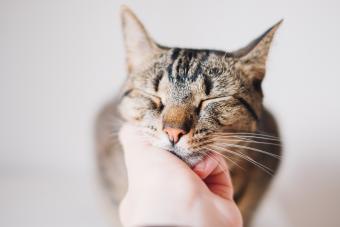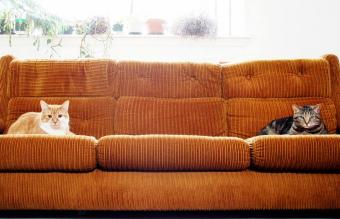
When cats headbutt, it is a sign of cat love. Cats have a superb sense of smell and use scent to mark territory, show affection, and leave other cats' messages. They headbutt to deposit scent in areas where they feel relaxed.
Why Does My Cat Headbutt Me?
Felines have a complex range of signals, and they often headbutt other cats and owners to let family members know they're part of the club. Cat headbutting is an obvious sign of your cat's mood. The medical term is bunting. Cats spread scent from glands on their cheeks, paws, and tail by rubbing them on surfaces, other cats, and humans.
Headbutting Is a Display of Affection
Cats don't hide their feelings. If a cat headbutts you, then your beloved feline is making contact for a reason. Headbutting is a lovely sign of affection and trust. Your feline friend is happy.
Cats Use Pheromones to Communicate
Cats activate scent glands or pheromones all over their body but especially their face. Head bunting is a behavior that pet parents see when felines are hungry or want to play. Cats have scent glands on their paw pads, lips, cheeks, and forehead.
Felines Mark Territory to Alert Others to Strangers
Cats that live together will rub each other along the flanks or the head, creating a group scent that alerts them to the presence of strangers.
Feral Cats Headbutt to Maintain Peace
Head bunting is also an integral part of feral cat behavior within large colonies. In a colony of feral cats, head bunting is a sign of trust and loyalty. As a feral cat colony expands, the dynamic changes with stronger cats ousting weaker rivals. This behavior is a strong form of communication among cats, and senior members headbutt younger felines.
Cats Headbutt Family Members
Cats rub family members to mark everyone as part of the "gang," and pet lovers should never ignore a cat that makes this move first. He's trying to be your buddy. Some cats show you a fluffy cat tummy, purr, or bring you gifts, and others headbutt you. Cats are not as low-maintenance as dogs, and pet lovers must pay attention to what cats are trying to say. Bunting is an important form of communication. Only fictional cats like the Cheshire Cat from Alice in Wonderland has an unmistakable grin!
- When you sit on the couch before mealtime, your cat may headbutt you. Your feline buddy is happy to see you and probably hungry.
- Cats don't share as many facial expressions as some dogs. Felines use their bodies and scent glands to leave a message.
- Headbutting may be followed by a nibble! Always pay attention to what happened before this incident. Don't ignore your cat.
- After your cat engages you with a headbutt, initiate some playtime. Grab the teaser wand toy from the closet and invite your cat to chase the feathers.
Headbutting Versus Head Pressing
The two terms can be confusing and are not interchangeable. Head pressing is a neurological disorder and a sign of a serious medical condition. Pet owners need to see their vet right away if they notice a cat pressing their head against a wall for no apparent reason. Pet lovers need to distinguish headbutting from head pressing when there are other behaviors involved:
- Abnormal vocalization other than purring
- Disorientation of any kind
- Compulsive behavior including pacing
- Change in behavior or anything that looks off
- Obvious visual impairment
Head Bunting Is Scent Marking
Cat behavior is fascinating, and headbutting is a clear sign you're part of their family. Wildcats, feral, and house cats all share this behavior; lions also headbutt as a form of greeting. With that in mind, always acknowledge a cat if they headbutt you. After all, you're part of the gang now, and your cat is bonding with you. When it comes to cat communication, headbutting is a sign of trust and affection.







